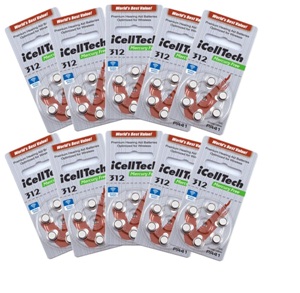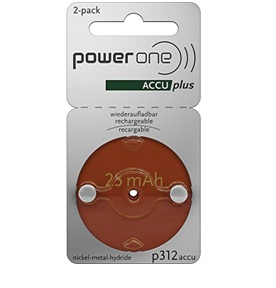Disposable vs. Rechargeable Hearing Aid Batteries: A Short Comparison
Aug 11th 2021

No two hearing aids are exactly the same, as long as they are from different manufacturers or of a different model. Some of them will take the same batteries, but then again, not all hearing aid batteries are the same, either. That’s why they all have those different little colored tabs. They protect the batteries and make it easier for you to tell them apart - it makes it possible to distinguish between, say, a size 13 hearing aid battery and a size 312. We all know that if it wasn’t for those little orange (13) and brown (312) tabs, it would be basically impossible to tell them apart.
But size is not the only thing that differentiates hearing aid batteries, either. There is also how the battery operates. For example, there are silver-zinc batteries, nickel-metal hydride batteries, zinc-air batteries that require oxygen to release energy through a complex chemical reaction, and lithium-ion batteries.
Of course, the latter type of batteries for hearing aids starts to draw the difference between rechargeable batteries and disposable batteries. Because the batteries themselves differ so widely and the hearing aids that can accept them may differ in their features or functionality, it’s best to do your research or consult with a hearing care professional before you make a choice about which to use.
A basic background in operation will help with understanding all of this so that you can make the right choice.
What Are Disposable Hearing Aid Batteries?
Simply put, disposable hearing aid batteries are batteries that can only be used once. After the battery life has expired, the batteries die and need to be thrown away. Then the hearing aids that take them need to have their hearing aid batteries replaced.
There are four main sizes of disposable hearing aid batteries, being, from smallest to largest, sizes 10, 312, 13 and 675. In the same order, you can identify these batteries according to the color of the tab that protects them, which is either yellow, brown, orange or blue.
These tabs don’t just make it easier to identify these types of batteries. It also protects the life of the battery since most disposable hearing aid batteries are zinc-air batteries. The fuel cells of these batteries contain a chemical compound that is reactive with air. Once you remove the tab, air will enter the cell, catalyzing a reaction and releasing energy. Once you remove the tab of the battery, the battery will slowly drain until it dies, so it is imperative to leave the tab in place until you intend to use the battery.
Advantages of Disposable Hearing Aid Batteries

If your hearing aid uses disposable batteries, like size 312s, which are very common, you’ll be happy to know that there are a lot of advantages to this technology, despite the fact that the batteries can only be used one time.
●Decent battery life
The life of an individual disposable hearing aid battery will vary, but even the shortest-lived disposable batteries will probably last a few days on the shorter side. The smaller batteries, like size 10s, will still last anywhere from 3 days to as long as a week. Larger batteries, like 675 batteries, can actually close to 3 weeks before they will need to be replaced.
●Individual cost of batteries is not particularly high
We get it. Hearing aid batteries are expensive. That’s something that has been repeated time and time again, and we know that the costs rack up over time, but still, disposable hearing aid batteries are still relatively affordable when you consider the unit cost. This is especially true when you consider that these little things actually enable you to hear. Plus, you can drive down the cost by keeping your hearing aids and the batteries themselves in good shape.
●Batteries can last a while when sealed and stored properly
The other thing to remember is that disposable hearing aid batteries, despite the fact that they can only be used once, can be kept for up to a few years as long as you keep them cool, dry and sealed. They’re also really small, so if you hit a sale you can stock up on them and keep them somewhere safe until you need them. Also, if you think about it pragmatically, a few years will give you enough time to strike another sale, which will help you keep your costs down!
●They’re usually easy to find
Hearing aids aren’t the only complex, minute electronic devices that take equally minute batteries. Watches and other small electronics take these little “button” batteries as well, and they’re often sold all in one place at battery kiosks. They’re not as easy to find as AAs and AAAs, but they’re not exactly rarities either. The good news is that most pharmacies and big-box retailers will have them - and of course, specialty sellers like Local Battery.
Disadvantages of Disposable Hearing Aid Batteries
However, despite the fact that there are plenty of advantages associated with disposable hearing aid batteries, it’s not all positive. Here are some of the downsides to using a hearing aid that takes disposable batteries.
●Batteries can die unexpectedly
It’s not so much that the batteries themselves will die unexpectedly. It’s more that the batteries can die at inconvenient times. Since they usually last several days, it’s possible that you could be out or busy when your batteries die or start to fail on you. That’s highly inconvenient when you have responsibilities.

●If you remove the tab, the battery will eventually die whether you use it or not
Another problem with air-powered disposable hearing aid batteries is that if you accidentally remove the tab, the batteries will start to die on you whether you put them in a hearing aid or not. This makes proper storage of hearing aid batteries imperative, especially if you want to be able to hang onto a surplus for extended periods of time. Since rechargeable batteries can hold a charge and obviously can be recharged, you don’t need to worry about tabs or the batteries just going dead on you.
●Batteries must be replaced relatively frequently
Some rechargeable hearing aid batteries are compatible with hearing aids, which devices themselves can be plugged in to recharge them. Though you might have to do this daily, that doesn’t free you from the fact that when disposal hearing aids die, they need to be removed and replaced from the affected hearing aids. Some people might find this difficult due to motor impairment, or just a downright hassle, and we can’t blame them.
●Battery life varies according to conditions
Extreme temperatures, humidity, and the condition of the hearing aid itself can all impact the life of disposable hearing aids. You might count on a size 13 hearing aid battery to last you for nearly two weeks, but if the conditions aren’t right, that time might get cut in half or further. There is a good deal of variability in the lifespan of disposable batteries, and it’s something you need to budget for.
●Lifetime cost of purchases can be high
While the individual cost of purchase might not be too high, over years and years of use, that expense can rack up, which leaves some hearing aid users turning to an alternative to disposable batteries - rechargeable hearing aid batteries.
What Are Rechargeable Hearing Aid Batteries?
Simply put, rechargeable hearing aid batteries are hearing aid batteries that have rechargeable battery technology. That is to say, they have a cell that can be charged and then will hold a charge before it needs to be charged again. This stands in contrast to disposable hearing aid batteries, many of which require air as a catalyst and will eventually die, lacking the ability to be recharged. Rechargeable batteries
While the technology will vary, rechargeable batteries don’t need to be replaced as frequently as disposable batteries and most of them have a significantly longer overall lifespan. Here are some of the additional benefits of rechargeable batteries.
Advantages of Rechargeable Hearing Aid Batteries
If you’re looking for a new set of hearing aids and are kicking around one that takes rechargeables, here are some of the draws.
●Most charge quickly and can be charged easily
Many owners will charge their hearing aids overnight because it is convenient and natural to do so. After all, you don’t need your hearing aids while you sleep. However, many rechargeable batteries can reach a full charge in just a few hours - less than a full night. Also, some hearing aids can be plugged directly in, so you don’t need to fiddle with tiny batteries.
●You may not need to change the batteries as often
Many rechargeable batteries will last a full day or maybe even more on a single charge, but that doesn’t mean you need to remove and replace them then. If your hearing aids can be plugged in, you won’t need to replace the batteries themselves for a long time.
●Less waste on the environment
When properly cared for, rechargeable batteries will last a long time, hundreds of cycles as compared to disposable batteries, if not longer. That equates to hundreds of disposable batteries that would otherwise be thrown away, as opposed to one pair of rechargeables or just a few.
●Might be able to save money in the long run
Since you can recharge these types of batteries many times before they will need to be serviced or replaced, they may give you the ability to save money in the long run, even if there is a high upfront cost.
●Proprietary technology
Though this doesn’t have to do with the actual batteries themselves, sometimes the hearing aids that take rechargeable batteries feature updated or advanced technology. For example, hearing aids that take rechargeable batteries might feature improved signal processing for better, clearing sound transmission. Just one other thing to consider.
Disadvantages of Rechargeable Hearing Aid Batteries
Before you make moves to replace your current hearing aids with those that take rechargeable batteries, remember, it’s not all bonuses. There are some distinct disadvantages to using rechargeable batteries as well.
●Shorter battery life per charge
Some rechargeable batteries will last up to or longer than 24 hours, but even the longest-lived rechargeable batteries will probably not last longer on a single charge than even short-lived disposable batteries. This means frequent, even daily charges.
●Some batteries must be replaced by the manufacturer
Some rechargeable batteries need to be sealed within the hearing aid itself, which means that you won’t be able to replace them even when they need to be replaced. Many of them will need to be sent back to the manufacturer or to a specialist in order to be serviced or replaced.
●High-upfront cost, difficult to find
In addition, some rechargeable batteries will be expensive upfront, or the hearing aids themselves will be, which can turn some users off. Also, it can be a lot more difficult to find the batteries or parts that go with them and you will need to shop with a dedicated specialist. If you were just shopping for the disposable batteries for a different model, it would probably be a lot easier to find the batteries; you won’t necessarily need to shop with a specialist provider.
Why Shop with Us for Your Rechargeable Hearing Aid Batteries
Now that you know a little more about what you need to consider before buying a new pair of batteries, you can get what you need here - whether disposable or rechargeable. We have all different types of batteries and parts for hearing aids - our selection is not to be beaten and our prices are excellent as well. In addition, we offer excellent service and fast, reliable shipping - if you need to address any questions before proceeding, just get in touch with us and we’ll be more than happy to answer your questions before you buy! You can reach us at sales@localbattery.com. Send us over your questions and we’ll field them!


